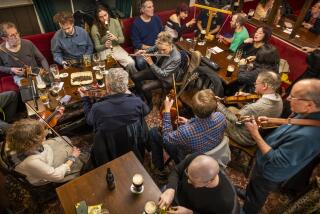Family-Style Fare on Tap as the Traditional British Pub Evolves
- Share via
LONDON — British publicans are pursuing profits by mixing pints with playgrounds at family-style pubs, shunning traditional names like King’s Head for Charlie Chalk Fun Factory and the Wacky Warehouse Play Barn.
Across England, the traditional “local,” as neighborhood pubs are known, is giving way to themed bars and food-oriented pub restaurants as pub companies scramble to attract the fastest growing customer groups--females and families.
Pubs and children don’t usually mix, so pub companies have had to innovate. Whitbread Plc and other industry leaders are building “family-dedicated” sites with restaurants and indoor play centers.
“Pub retailers realized that there was a big market that wasn’t being catered to,” said Nigel Parson, an analyst at Charterhouse Tilney Securities. “You have got a situation in this country whereby you can take your pet dog to the pub but you can’t take your children.”
Whitbread Plc last month said it plans to spend 105 million pounds ($161 million) to build 72 family pubs this year.
It will build 52 Brewers Fayre roadside restaurants that offer children’s menus and drinks; convert 20 pubs to Family Inns, local establishments with separate drinking and dining facilities; and build 15 separate Charlie Chalk play centers at selected sites.
“The overall pub market looks like its facing five years of growth,” said Bill Shannon, the managing director of Whitbread’s managed pub division. “If you look at what is driving it, who is going to go to pubs more often, it’s families and it’s females and it’s people who want to go for food.”
Other pub companies are investing in the same strategy. Allied Domecq Plc has introduced Wacky Warehouses and Greenalls Group Plc offers Captain Coconut play centers. Bass Plc, Scottish & Newcastle Plc and Marston, Thompson & Evershed Plc are planning such brands as Deep Sea Den, Funny Forest and Billy Bears.
Currently, analysts estimate that only a few hundred of Britain’s 61,000 pubs have play centers, but aggressive capital expenditure programs ensure that new sites open every week.
“Pub owners are increasingly segmenting the market, and one area to concentrate on is families,” said Goldman, Sachs & Co. analyst Colin Davies. “I think you will continue to see more of it.”
Whitbread and other pub companies said the new customer base and wider profit range will sever publicans’ reliance on alcohol sales. Its also is expected to increase revenue in the next five years, after a 3.6% sales decline since 1990, led by a 9% drop in drink sales.
British pubs sell 5 billion pounds of food each year, said Whitbread, accounting for 27% of the total cash spent in pubs. Food sales in the next five years are expected to grow by 20%.
To cash in on this trend, Whitbread said 25% of its 1,650 pubs will serve food and cater to families by the end of the year.
In the past, children under age 14 were banned from bars. Pubs had to build separate rooms for families, a difficult task at many traditional pubs, some of which are as much as 900 years old.
When it deregulated the industry last year, the government introduced an alternative for families: children’s certificates, or permits, allowing pubs to admit children accompanied by their parents up until 9 p.m.
To qualify for the permit, pub owners have to meet national conditions, such as serving food and soft drinks during children’s hours, and local standards, such as barring children from bar stools and banning dominoes and other games.
As a result, children’s certificates are unpopular. Fewer than 3% of pubs have applied for one, according to the Brewers and Licensed Retailers Assn.
“The system isn’t working,” said BLRA spokesman Mike Ripley. “The intention of the act was to make life easier for families and it hasn’t.”
Instead, many pub operators find it easier to build pubs designed specifically for families. Examples, such as Whitbread’s Brewer’s Fayre, look more like restaurants and often offer indoor play centers for children.
More to Read
Inside the business of entertainment
The Wide Shot brings you news, analysis and insights on everything from streaming wars to production — and what it all means for the future.
You may occasionally receive promotional content from the Los Angeles Times.









